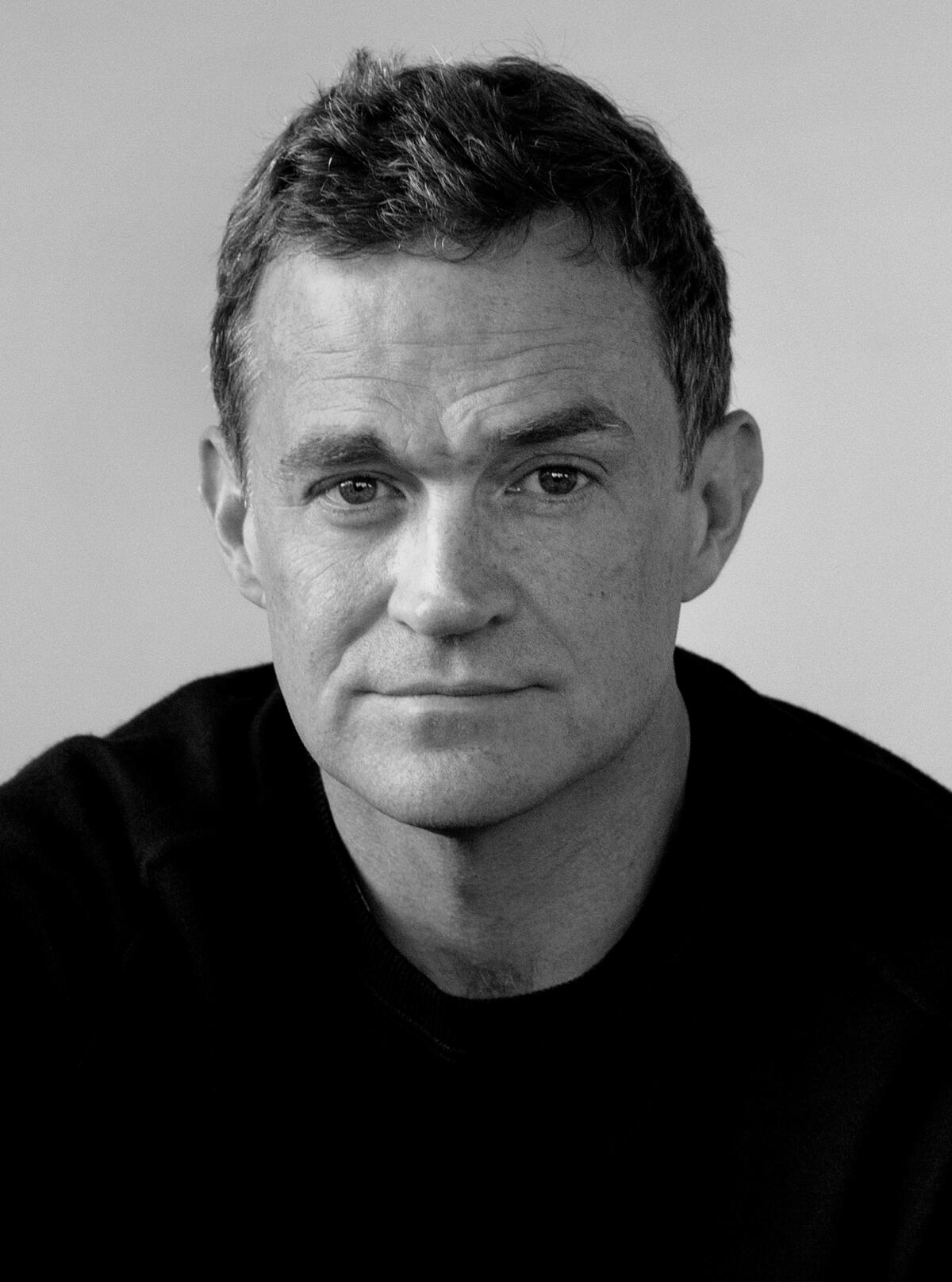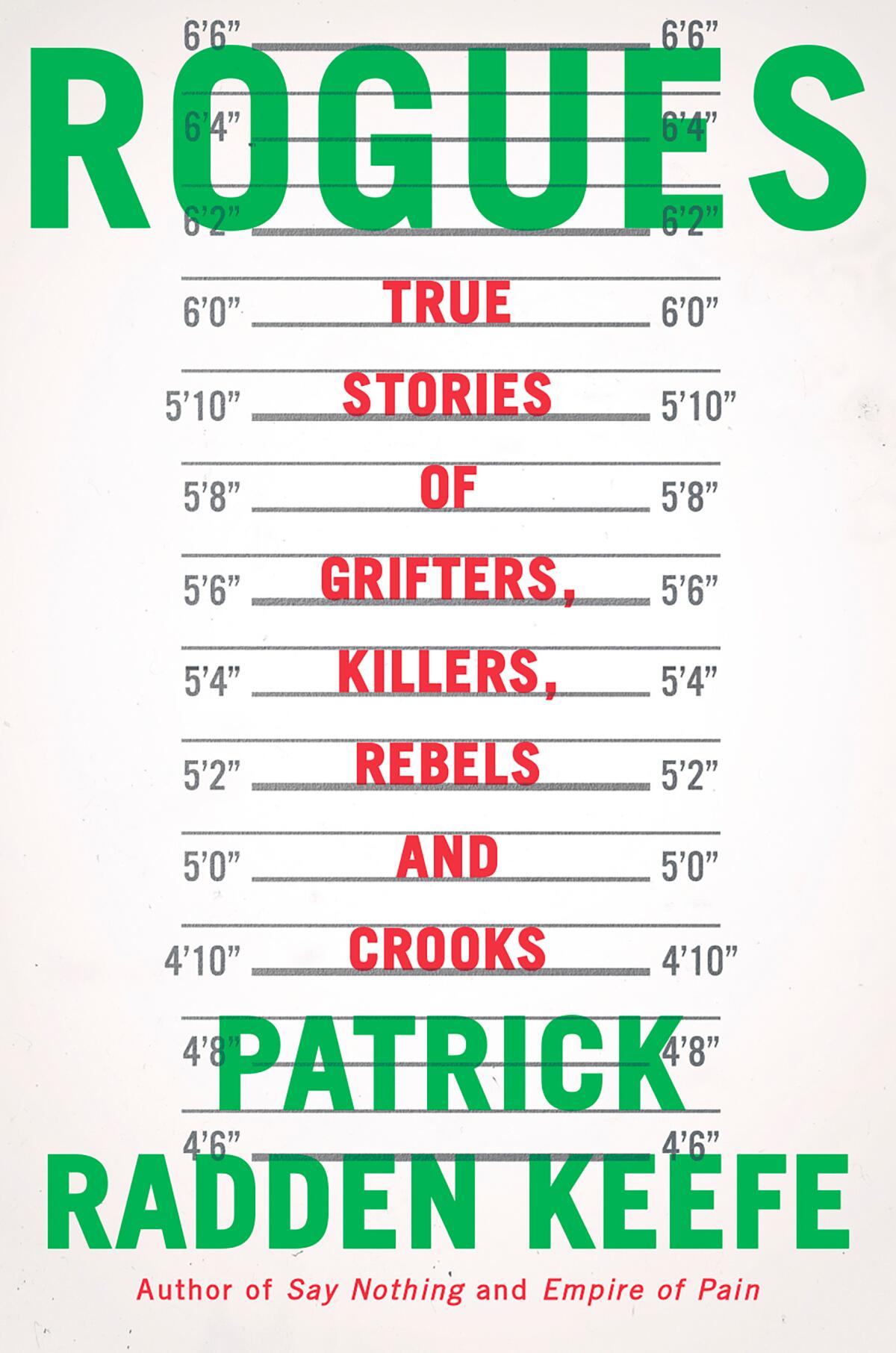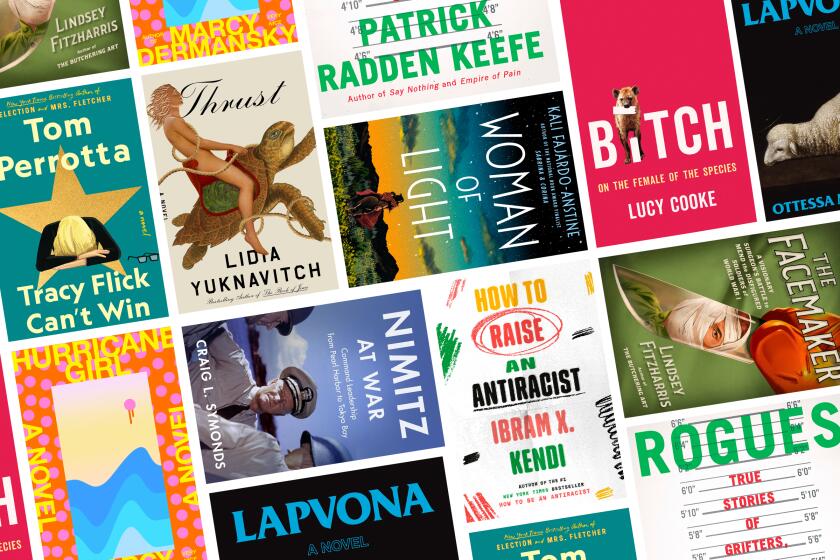For Sackler exposé writer Patrick Radden Keefe, truth is always stranger than fiction

On the Shelf
Rogues: True Stories of Grifters, Killers, Rebels and Crooks
By Patrick Radden Keefe
Doubleday: 368 pages, $30
If you buy books linked on our site, The Times may earn a commission from Bookshop.org, whose fees support independent bookstores.
Astrid Holleeder is the sister of a Dutch gangster, risking her life to bring him down. Hardy Rodenstock may be the greatest con artist in the world of vintage wines. Amy Bishop is the rare woman mass shooter, with a deadly secret in her past.
These three are brought vividly to life in “Rogues: True Stories of Grifters, Killers, Rebels and Crooks,” a collection of Patrick Radden Keefe’s New Yorker articles. Keefe’s previous two books were both acclaimed bestsellers, full-length nonfiction narratives about the Troubles in Northern Ireland (“Say Nothing”) and how the Sackler family drove America into the opioid crisis (“Empire of Pain”).
The emphasis in “Rogues,” out this week, is on criminals (from insider traders on up to El Chapo), but the stories cover a wide range of people, including celebrity chef Anthony Bourdain; a computer technician who revealed the secrets of the Swiss banking industry; the death penalty lawyer who defended the Boston Marathon bomber; and producer Mark Burnett, who resurrected Donald Trump with “The Apprentice.”
Speaking to The Times via videoconference, Keefe outlined the thematic links among his stories, as well as the art of making people care about random topics and the limits of what journalists can accomplish, in an interview that has been edited for length and clarity.
Patrick Radden Keefe’s much-anticipated “Empire of Pain” lays it all bare
How are these stories representative of your career and how are they linked?
I love getting to be a professional dilettante. I move from one subject to another, parachuting into a story, spending three to six months on it, then moving on to the next thing. In the moment I never feel like I’m pursuing a particular theme or subject, I’m just chasing whatever story is interesting. I thought I had free will when I’m picking stories, but in retrospect, I saw I keep going back to a handful of themes.
I’m fascinated by the categories we have for what is legal and illegal and what we call a crime and how we define those things. I’ve always been interested in denial and the stories people tell themselves, their families and their communities to rationalize the bad things they’ve done. The themes recur, but hopefully the characters and the lives they lead are varied.
Are you just trying to tell interesting stories in your work or do you hope to effect change?
I never think about the impact a story might have. I don’t think of myself as an activist, even if I find something outrageous, and I’m confused that other people aren’t outraged. My job as a journalist is to gather facts and tell a compelling story and get people engaged.
You occasionally affect reality with what you’re doing and that’s gratifying, but the vast majority of the time you’re describing the world, not changing it. And when you do change things, it’s in small ways.

Is it frustrating when the rich and powerful nevertheless walk away unscathed?
It’s part of the strangeness of the country we live in. When a company has a rotten culture, sometimes the company pleads guilty and sometimes individuals do or are convicted, but the people calling the shots at the top of the pyramid manage to avoid any legal liability.
That was true with the Sackler family or here with [billionaire] Steve Cohen and the insider-trading accusations against his company, SAC. But as a journalist, I can write a scrupulously fact-checked story about the government’s efforts to take him down and even though they were ultimately unsuccessful, you can read for the story and decide for yourself about the case.
When you write about topics like Swiss banking, insider trading or antique wines, do you think about readers who know nothing about the subject?
If there’s one thing I resent as a reader, it’s when a writer does a ton of great research but it feels like they’re just pushing it all across the table at me. For me the pleasure is in the distillation. You’ll never read a piece by me where you get a first section that’s colorful and engaging and then you get a paragraph break and then it says, “And now, a thousand words on the history of corn.”
The thing I always remind myself is that I’m interviewing people who are specialists or immersed in the details of the story, but the reader may know nothing about the topic. With the insider-trading scandal, that trial had been covered in the business section on a daily basis, but I felt there was a big opera version of the story. So I kept telling myself, “You’re not writing for the person who reads the business section, but for a person who sees a story about insider trading and turns the page.” Can I get that reader and pull them in with the sheer human drama?
“The Troubles” seems incommensurate — euphemistic even — as a descriptor of the social fission that cleaved apart Northern Ireland in the late 20th century.
Are you initially drawn to the larger narrative or to the people themselves?
It’s the people, the characters. It’s strange to call them characters, but I’m drawn to narrative storytelling. As a reader, if I pick up a book about some period in history or something in nature or a complex policy question and read a thousand words and don’t hit a human being, I find myself disengaging. I think we are hard-wired to process information in the form of stories about people.
You used the word “characters.” Do you worry about dramatic storytelling blurring lines so readers forget they’re reading about real people?
I’m unabashed about bringing in techniques from novels: where do I start the story, structure, characterization, suspense and withholding information. Blurring the lines comes when you cheat, getting out ahead of the factual information you’ve gathered.
I’m never tempted to do that. I tried writing fiction in college and failed. I couldn’t make up most of the stuff I discover in my reporting. If you put some of these details in a novel, no one would believe them. That’s what gives me so much satisfaction.
The book has a story about the sister of the biggest mobster in Amsterdam. She’s also a lawyer … and she’s his lawyer. And no one can catch him because no one can get close to him. But then she decides to turn on him. In a thriller it would feel too convenient, but these things happen in real life.
And in fiction, you could bang your head against the wall all day trying to find the perfect ending. With reporting, eventually somebody is going to say it and it will fall into your lap. You just need to be able to recognize it when it comes. Sometimes I’m interviewing someone and they say something, and I put a little star in the margin of my notebook, because when I hear it I know: That’s my last line.
Bethanne Patrick’s June highlights include Tom Perrotta’s ‘Election’ sequel, essential new war histories and a fresh look at females of all species.
More to Read
Sign up for our Book Club newsletter
Get the latest news, events and more from the Los Angeles Times Book Club, and help us get L.A. reading and talking.
You may occasionally receive promotional content from the Los Angeles Times.







